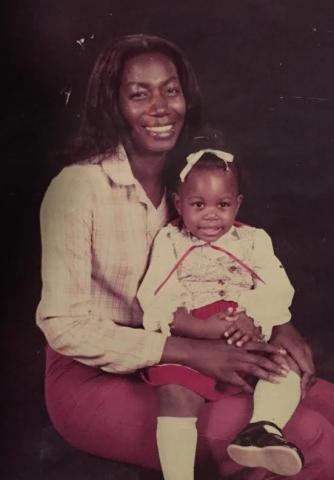
This Mother’s Day, Honor Your Mother’s Commitment to Putting Your Family First
Growing up in Jackson, Mississippi, I remember seeing my mom, a single mom, struggle to support us three kids by working multiple jobs, mostly manual labor in shipping and receiving at large warehouses.
My mom worked incessantly, but because of abysmal wages, those long hours never paid off. We still relied on government assistance to make ends meet, and some of our weekly meals still consisted of Top Ramen with cheese and Kool-Aid.
It is my mother who inspired me because of her resilience and perseverance amidst what I now understand as struggle and strife.
I always knew that I wanted to elevate the voices of people who shared similar experiences to mine and my family’s and to work toward changing our individual and collective conditions, which is how I first got involved organizing as an intern with Strategic Concepts in Organizing and Policy Education (SCOPE) in low-income African-American and Latino communities in South Los Angeles.
I remember my first “house meeting”—a small convening of community members getting together in one of their homes to share home-cooked food and discuss the issues they faced and what could be done to resolve them.
I was 21, freshly graduated from UCLA with plans for law school in my near future. In my mind, the internship with SCOPE was just for the summer.
As I scrawled notes on the butcher paper, they talked about how there weren’t enough jobs in their community, how the high un- and under-employment rates in South L.A. were even higher within Black and Brown communities like theirs and how this was all a result of historic disinvestment in their community and hundreds of other communities of color across the country.
It reminded me of my own family back home, of my mother who had to work two, sometimes three part-time, minimum wage jobs at a time because our community had nothing better to offer her.
That meeting was when I first heard people, who looked like my family, talking about the same problems that plagued my community, but with connections to solutions and power that were completely new to me.
By the end of the meeting, I understood that decisions are being made every day on my behalf without me, and I have the choice to be at the center of that decision-making, or sit on the side and reap the consequences.
From that day forward, I chose to be an agent of social change. That summer internship changed my life. Instead of law school, a summer at SCOPE turned into a year, and a year turned into 13.
That summer also made me start to realize what I know now through experience to be true— that storytelling is one of the most powerful tools we have in building a social movement.
Last week, I joined the Center for Community Change, Jobs With Justice, Center for Popular Democracy, The Leadership Conference on Civil and Human Rights, Working Families Organization and dozens of grassroots groups in Washington, D.C. to speak on a panel for the launch of the Putting Families First: Good Jobs for All campaign.
Through major community reinvestment projects, large-scale job creation programs to provide a good job for everyone who wants one and a national movement-building initiative to bring together people dedicated to creating change, this campaign has one audacious goal: to create an economy that works for all families.
As we work together toward this enormous objective, sharing our stories is critical for a number of reasons.
For one thing, we need to add our personal stories to the public conversation in order to combat the many myths propelled by those fighting against us. The right has a long, practiced history of building myths in the absence of facts to push forward the policies that suit them. These myths lean on long-held biases, often related to race or gender. Our stories are needed to build our own narrative—one based in truth and personal experience—to overcome this aggressive, manufactured counter-narrative.
Many people living on the brink are so occupied with the immediacy of their own problems that they are unable to connect their issues to a larger cause or a common solution. In his essay “Telling your Public Story: Self, Us, Now,” senior Harvard University lecturer and long-time organizer Marshall Ganz explains, “Because stories allow us to express our values not as abstract principles, but as lived experience, they have the power to move others.”
Storytelling allows people to step outside the microcosm of their own lives and see their problems in ways that are connected to other people, and it is that universal connection that gives people the courage, the hope and the sense of empowerment to act.
Your story has that power. I know mine does.
To this day, my mother still struggles to make ends meet, working long, physically demanding hours for low pay. No mother should face decades of hardship in order to raise a family.
“What helped me push through was putting my children first,” my mother told me recently.
As we join the fight to build a nation-wide movement of people fighting to put their families first in this economy, telling our stories is more important than ever which is why the coalition put together a new story collection tool called Our Stories Our Power. This new tool allows anyone with access to a phone, tablet or computer to view or share stories related to a number of economic justice issues.
Has your mother worked hard to put your family first, despite a difficult economic situation? Are you a mother who has fought for your family in a challenging economy? Honor the sacrifice mother’s make each day by sharing your story. This Mother’s Day weekend, visitwww.OurStoriesOurPower.org to share your story.
*Image featured at the top of the post is the author and her mother in the early 1980s.



The views and opinions expressed in this post are those of the author(s) and do not necessarily reflect those of MomsRising.org.
MomsRising.org strongly encourages our readers to post comments in response to blog posts. We value diversity of opinions and perspectives. Our goals for this space are to be educational, thought-provoking, and respectful. So we actively moderate comments and we reserve the right to edit or remove comments that undermine these goals. Thanks!